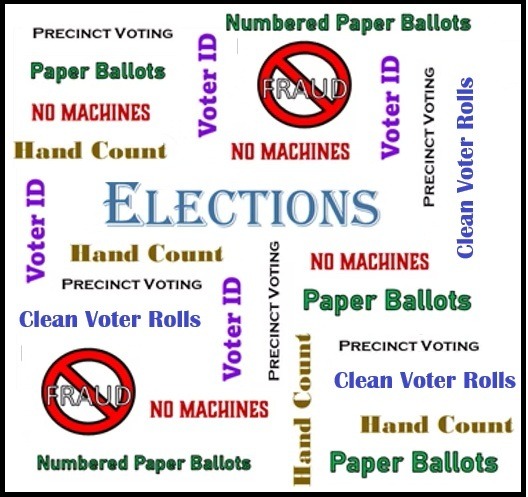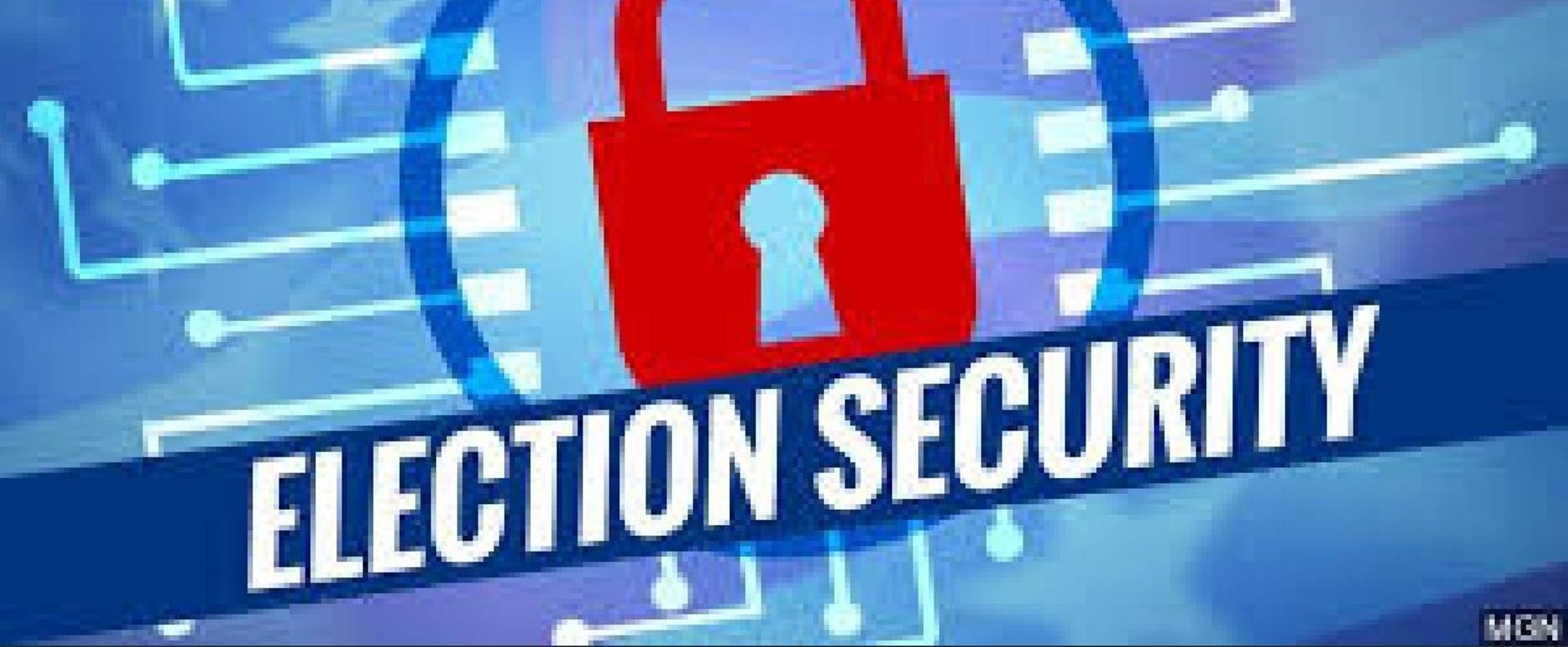
Debunking the Myth of Secure Elections in Idaho
Political leaders want to convince their constituents that Idaho elections are secure. But they don't want to investigate credible charges of fraud, provide transparency, or eliminate known problems.
9/15/20257 min read
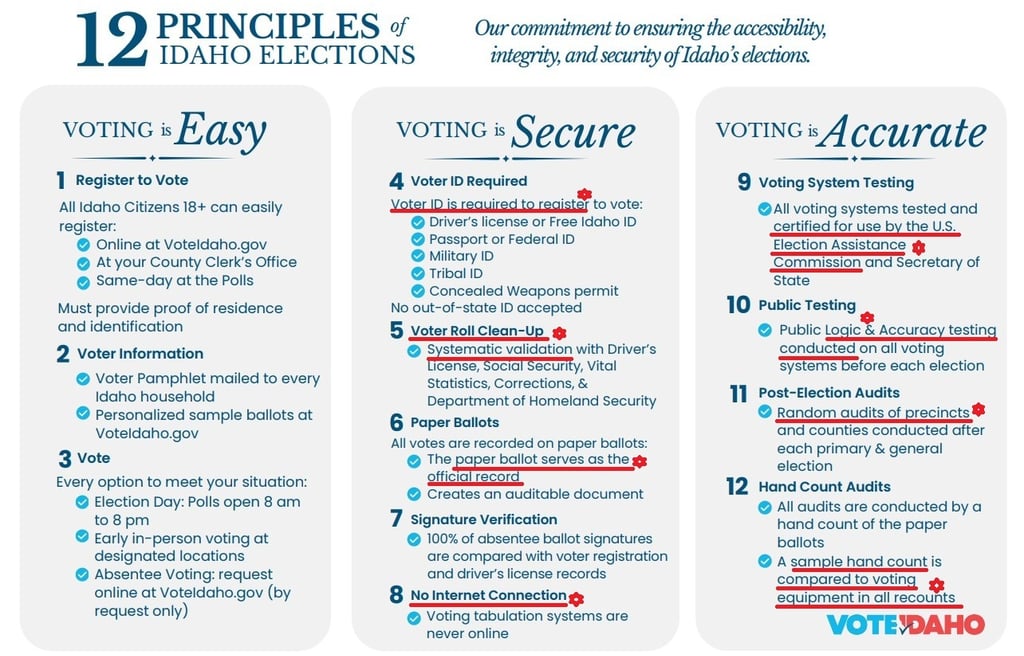

The Twelve Flawed "Principles of Idaho Elections"
Prior to the 2024 Election, Idaho’s Secretary of State distributed flyers to all registered voters assuring them that voting in Idaho was secure. The flyer outlined Twelve Principles that “ensure the accessibility, integrity, and security of Idaho’s elections”. But many of these principles omit critical information or are misleading. Some state partial truths that obscure known problems.
The full truth is that Idaho elections are vulnerable to computerized fraud, and this has been known for over four years. Soon after the notorious, stolen election of 2020, Dr. Douglas Frank proved beyond all doubt that computer algorithms were being used to corrupt voter rolls and to insert fraudulent ballots in ALL states, including Idaho. And since that time concerned citizens have brought more proof of voter roll manipulation, absentee ballot fraud, and even tabulator fraud, but to no avail.
It is understandable that Idaho political leaders want voters to believe that their elections are honest and safe. But the right way to make Idaho elections secure is to investigate credible charges of fraud and eliminate known vulnerabilities; not to paper over them.
In the following sections we review eight of the Twelve Principles of Idaho Elections, and show how misleading many of them are.
Idaho Elections are NOT Secure
4) Voter ID is Required—Possession of a valid photo ID is required when registering to vote in person. But Idaho allows for both online voter registration and mail-in registration. And it is impossible to prove possession of a valid photo-ID when there is no need to appear in person.
What is used in lieu of photo ID in these cases is knowledge of a valid Idaho driver’s license number. But it is not difficult for fraudsters to obtain Idaho DL numbers and personal data, and with this information they can impersonate a current or former Idaho resident, register online, and immediately request an absentee ballot, without ever appearing before an elections official. But does this actually happen? Yes it does. As of November 2024, seven percent of registered voters in Kootenai County had ONLY ever voted by absentee ballot, NEVER in-person.
5) Voter Roll Cleanup—Software running in the Secretary of State's office is supposed to verify voter rolls by comparing registration data against other government databases. Unfortunately, the method it uses to validate voter rolls is fatally flawed. First because it allows for invasive collection of personal data on every Idaho voter, and secondly, because the statute that provides for voter roll verification (HB 339) has egregious loopholes that allow for continued fraudulent registrations. The failures of HB 339 are discussed in the article Data Collection Disguised as Election Integrity.
One of many problems with the current system is that all registration data is verified at one time, 90 days before the election. This means that anyone who registers after this date will be allowed to vote before their eligibility is confirmed. But nearly all new voters register within this three month window.
6) Paper Ballots Serve as Official Records—Idaho voters cast paper ballots, but they are processed by machines, and the ballot images generated by potentially fraudulent tabulators are used as official public records. The fact that the same computer tallies votes and generates ballot images destroys transparency, and means there is no way to verify that the ballot images produced by the tabulators match the paper ballots.
And when concerned citizens request access to the physical ballots, they are refused, even after two years, when the ballots are "obsolete", and slated to be destroyed. Private citizens have requested access to obsolete ballots from five different County Clerks, but in all cases the requests were denied.

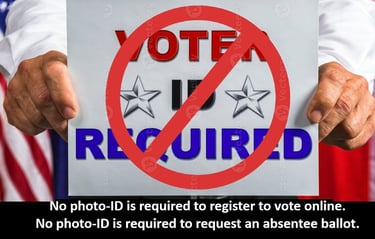
8) No Internet Connection—It is meaningless to claim that that Idaho’s tabulation machines have "No Internet Connection" when tabulators don't need to be connected to the internet to communicate wirelessly. Any electronic device with a wireless card, or a USB Wi-Fi adaptor, can communicate with another computer in close proximity, using an alternative wireless protocol, such as Bluetooth. And even if a tabulator doesn't have a wireless card installed, all tabulators have USB ports.
To say a device has "no internet connection" only means it cannot communicate directly with a remote computer. But since most tabulators operate in close proximity to laptops and electronic pollbooks that are connected to the internet, it is possible that Idaho tabulators could be controlled by the same centralized Election Management software that manages Idaho pollbooks.
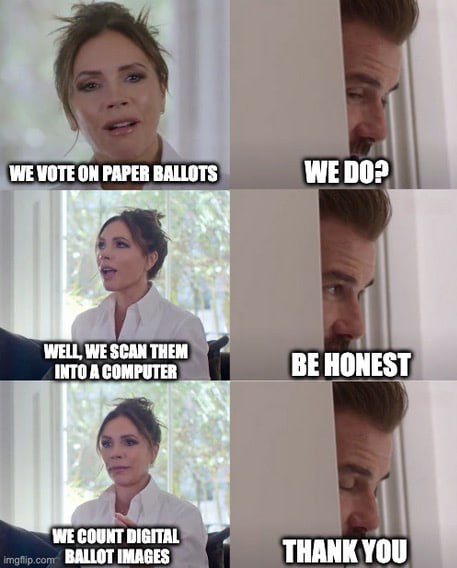

Fraudulent registrations are discussed in the articles Electronic Registration Opens the Door to Fraud and Digital Identities and Phantom Voters. They are a bigger problem than they seem, because they are the lynchpin of the whole system of computerized election fraud in Idaho.


Idaho Elections are NOT Accurate
9) Certified by the U.S. Elections Assistance Commission—It is true that Idaho tabulators are "Certified by the EAC". But certification is not what most people think. EAC certification only confirms that a tabulator is capable of counting votes accurately. It does not guarantee the security of the system, and it does not make any claim that the machines cannot be hacked. Furthermore, EAC certification comes with a long list of disclaimers that state that the product is “not endorsed by the U.S. Government, and no warranty . . . is either expressed or implied.”
The original EAC VVSG 1.0 standards of security were so loose that new standards, VVSG 2.0. were adopted in 2021. But Idaho's current generation of tabulators do not and cannot meet EAC's VVSG 2.0 standards. Even worse, no standards for testing Idaho's electronic pollbooks, or centralized election management software, have even been devised. So EAC certification is almost meaningless, and is useful mainly to give voters a false sense of security.



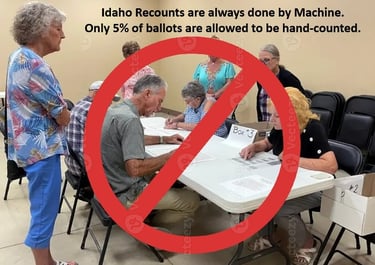
12) Recounts are NOT Hand Counted—It surprises many people to learn that, according to Idaho statutes, all races that were originally counted on an electronic tabulator MUST be recounted on the same tabulator. This explains why so few candidates request recounts, and why recounts virtually always verify the initial result.
It is true that up to 5% of recounted ballots may be hand-counted and compared to a machine count of the same ballots. But unless the sample hand-count varies by half a percent or more from the machine count, the rest of the ballots MUST be tabulated by machine, and candidates are never given access to independently review the physical ballots.
10) Public Logic and Accuracy Tests—These are done in advance of each election, but they are extremely simple, and only verify that each candidate and issue on the ballot is capable of being read and recorded. L&A tests assure basic functionality but they do nothing to assure accuracy beyond making sure the tabulation machine was programmed correctly for a particular election.
11) Post Election Audits—The "random" audits done by the Secretary of State's Office after even-year elections are very limited. Only a few precincts in selected counties are audited, only one race per county is considered, and local, off-year elections, such as municipalities and schoolboards, are NEVER audited. In some cases, early and absentee votes are not included in the audit, and in no case are more than 5% of precincts hand-counted.
Besides being extremely limited, the audits the SOS does are designed to identify procedural problems in elections offices, not to root out fraud. Fraud occurs mainly in close and contentious races, so audits that were intended to uncover fraud would include local races (odd year elections), and would target close contests.

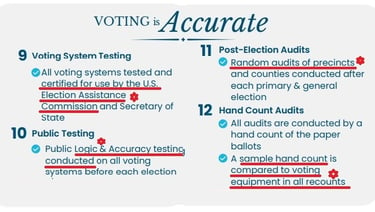
Restoring Confidence by Fixing Problems
Not all of the problems listed above can be fixed legislatively, but many can. The truth is that Idaho's original Title 34 Election Statutes were sound. They were written many years ago to provide for in-person voter registration, in-person voting, and hand-counted elections, which are still the gold standard for election security.
Many of the problems with Idaho elections are due to modifications to election statutes made in the last twenty years to provide for computerized elections. These changes were made when most legislators did not understand the potential for fraud that is inherent in electronic systems, and were unaware of the risks of turning over election management to computers.
In many cases the newer statutes sacrifice security and auditability to allow for automation. For example, 34-409 (Electronic Registration), allows for voter registration without a signed oath or a registration card. And 34-2313 (Recount procedures for Electronic Tabulators), sets entirely different standards for recounting races, depending on how the initial tabulation was done.
These types of problems must ultimately be fixed by legislators, but in most cases the best remedy is not to add new laws. It is to rescind recently added complexity, decentralize election data management, and return as much as possible to the original laws that guided Idaho elections. The follow up article, Legislative Fixes to Idaho Elections makes some specific suggestions.
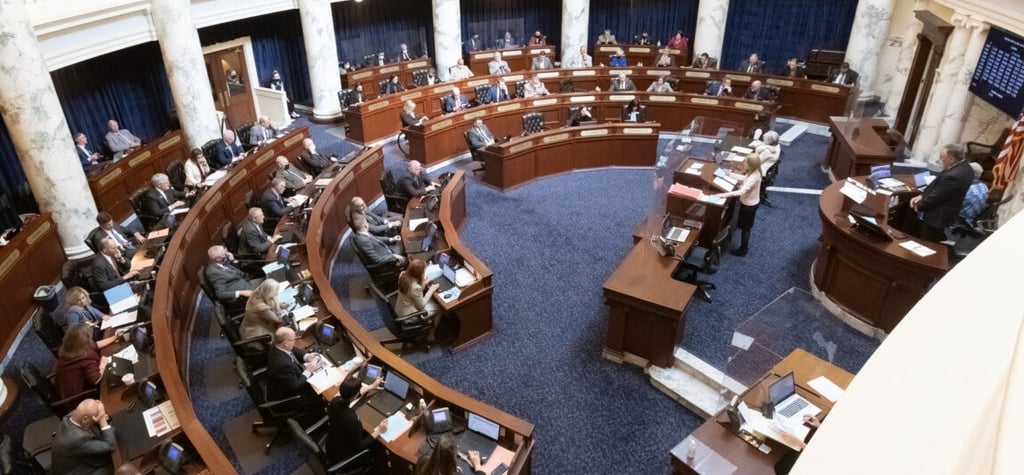

Empowering Voters
Advocating for transparent, honest, and decentralized voting systems.
Please subscribe to the Eye on Elections Newsletter.
Contact us:
© 2025. All rights reserved.
